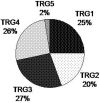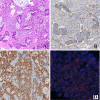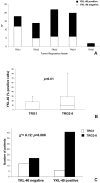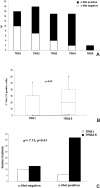YKL-40/c-Met expression in rectal cancer biopsies predicts tumor regression following neoadjuvant chemoradiotherapy: a multi-institutional study
- PMID: 25875173
- PMCID: PMC4398550
- DOI: 10.1371/journal.pone.0123759
YKL-40/c-Met expression in rectal cancer biopsies predicts tumor regression following neoadjuvant chemoradiotherapy: a multi-institutional study
Abstract
Background: Neoadjuvant chemo-radiotherapy (CRT) followed by surgical resection is the standard treatment for locally advanced rectal cancer, although complete tumor pathological regression is achieved in only up to 30% of cases. A clinicopathological and molecular predictive stratification of patients with advanced rectal cancer is still lacking. Here, c-Met and YKL-40 have been studied as putative predictors of CRT response in rectal cancer, due to their reported involvement in chemoradioresistance in various solid tumors.
Material and methods: A multicentric study was designed to assess the role of c-Met and YKL-40 expression in predicting chemoradioresistance and to correlate clinical and pathological features with CRT response. Immunohistochemistry and fluorescent in situ hybridization for c-Met were performed on 81 rectal cancer biopsies from patients with locally advanced rectal adenocarcinoma. All patients underwent standard (50.4 gy in 28 fractions + concurrent capecitabine 825 mg/m2) neoadjuvant CRT or the XELOXART protocol. CRT response was documented on surgical resection specimens and recorded as tumor regression grade (TRG) according to the Mandard criteria.
Results: A significant correlation between c-Met and YKL-40 expression was observed (R = 0.43). The expressions of c-Met and YKL-40 were both significantly associated with a lack of complete response (86% and 87% of c-Met and YKL-40 positive cases, p< 0.01 and p = 0.006, respectively). Thirty of the 32 biopsies co-expressing both markers had partial or absent tumor response (TRG 2-5), strengthening their positive predictive value (94%). The exclusive predictive role of YKL-40 and c-Met was confirmed using a multivariate analysis (p = 0.004 and p = 0.007 for YKL-40 and c-Met, respectively). TRG was the sole morphological parameter associated with poor outcome.
Conclusion: c-Met and YKL-40 expression is a reliable predictor of partial/absent response to neoadjuvant CRT in rectal cancer. Targeted therapy protocols could take advantage of prior evaluations of c-MET and YKL-40 expression levels to increase therapeutic efficacy.
Conflict of interest statement
Figures





Similar articles
-
Tumor microRNAs Identified by Small RNA Sequencing as Potential Response Predictors in Locally Advanced Rectal Cancer Patients Treated With Neoadjuvant Chemoradiotherapy.Cancer Genomics Proteomics. 2020 May-Jun;17(3):249-257. doi: 10.21873/cgp.20185. Cancer Genomics Proteomics. 2020. PMID: 32345666 Free PMC article.
-
The prognostic value of tumour regression grade following neoadjuvant chemoradiation therapy for rectal cancer.Colorectal Dis. 2014 Jan;16(1):O16-25. doi: 10.1111/codi.12439. Colorectal Dis. 2014. PMID: 24119076
-
Identification of a biomarker profile associated with resistance to neoadjuvant chemoradiation therapy in rectal cancer.Ann Surg. 2011 Sep;254(3):486-92; discussion 492-3. doi: 10.1097/SLA.0b013e31822b8cfa. Ann Surg. 2011. PMID: 21865946 Free PMC article. Clinical Trial.
-
[Histologic response after neoadjuvant therapy in rectal adenocarcinoma: own experience and review of the literature].Orv Hetil. 2006 Oct 22;147(42):2011-20. Orv Hetil. 2006. PMID: 17165600 Review. Hungarian.
-
Predicting the response to preoperative radiation or chemoradiation by a microarray analysis of the gene expression profiles in rectal cancer.Surg Today. 2012 Aug;42(8):713-9. doi: 10.1007/s00595-012-0223-8. Epub 2012 Jun 16. Surg Today. 2012. PMID: 22706722 Review.
Cited by
-
Novel radiation and targeted therapy combinations for improving rectal cancer outcomes.Expert Rev Mol Med. 2024 Apr 16;26:e14. doi: 10.1017/erm.2024.15. Expert Rev Mol Med. 2024. PMID: 38623751 Free PMC article. Review.
-
Prognostic and predictive role of YKL-40 in anal squamous cell carcinoma: a serological and tissue-based analysis in a multicentric cohort.Front Med (Lausanne). 2024 Jul 9;11:1372195. doi: 10.3389/fmed.2024.1372195. eCollection 2024. Front Med (Lausanne). 2024. PMID: 39045410 Free PMC article.
-
The Assessment of Clinical Usage and Prognostic Value of YKL-40 Serum Levels in Patients With Rectal Cancer Without Distant Metastasis.Technol Cancer Res Treat. 2018 Jan 1;17:1533033818765209. doi: 10.1177/1533033818765209. Technol Cancer Res Treat. 2018. PMID: 29642772 Free PMC article.
-
ceRNA Networks: The Backbone Role in Neoadjuvant Chemoradiotherapy Resistance/Sensitivity of Locally Advanced Rectal Cancer.Technol Cancer Res Treat. 2021 Jan-Dec;20:15330338211062313. doi: 10.1177/15330338211062313. Technol Cancer Res Treat. 2021. PMID: 34908512 Free PMC article.
-
[Changes in serum YKL-40 level and humoral immune function and their significance in children with recurrent pneumonia].Zhongguo Dang Dai Er Ke Za Zhi. 2017 Apr;19(4):425-429. doi: 10.7499/j.issn.1008-8830.2017.04.013. Zhongguo Dang Dai Er Ke Za Zhi. 2017. PMID: 28407830 Free PMC article. Chinese.
References
-
- Frykholm GJ, Pahlman L, Glimelius B. Combined chemo- and radiotherapy vs. radiotherapy alone in the treatment of primary, nonresectable adenocarcinoma of the rectum. Int J Radiat Oncol Biol Phys. 2001;50: 427–434 - PubMed
-
- Bosset JF, Collette L, Calais G, Mineur L, Maingon P, Radosevic-Jelic L, et al. Chemotherapy with preoperative radiotherapy in rectal cancer. N Engl J Med. 2006;355: 1114–1123 - PubMed
-
- Janjan NA, Khoo VS, Abbruzzese J, Pazdur R, Dubrow R, Cleary KR, et al. Tumor downstaging and sphincter preservation with preoperative chemoradiation in locally advanced rectal cancer: the M. D. Anderson Cancer Center experience. Int J Radiat Oncol Biol Phys. 1999;44: 1027–1038 - PubMed
Publication types
MeSH terms
Substances
Grants and funding
LinkOut - more resources
Full Text Sources
Other Literature Sources
Research Materials
Miscellaneous

